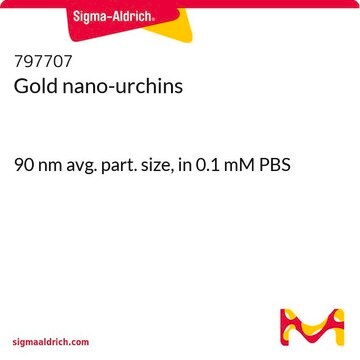797723
Gold nano-urchins
80 nm avg. part. size, in 0.1 mM PBS
Synonyme(s) :
Gold nanoparticles, Non-functionalized gold nanoparticles
About This Item
Produits recommandés
Description
Particles:∼7.82E+9/mL
Forme
liquid
nanourchin
DO
1
Taille moy. des particules
80 nm
λmax
620 nm
Température de stockage
2-8°C
Vous recherchez des produits similaires ? Visite Guide de comparaison des produits
Application
Code de la classe de stockage
12 - Non Combustible Liquids
Classe de danger pour l'eau (WGK)
nwg
Point d'éclair (°F)
Not applicable
Point d'éclair (°C)
Not applicable
Faites votre choix parmi les versions les plus récentes :
Certificats d'analyse (COA)
Vous ne trouvez pas la bonne version ?
Si vous avez besoin d'une version particulière, vous pouvez rechercher un certificat spécifique par le numéro de lot.
Déjà en possession de ce produit ?
Retrouvez la documentation relative aux produits que vous avez récemment achetés dans la Bibliothèque de documents.
Articles
Biomaterials science involves the design and fabrication of smart materials for studying, directing, or mimicking biology. For successful integration of biomaterials in biological research, a meaningful understanding of biological systems is required.
Notre équipe de scientifiques dispose d'une expérience dans tous les secteurs de la recherche, notamment en sciences de la vie, science des matériaux, synthèse chimique, chromatographie, analyse et dans de nombreux autres domaines..
Contacter notre Service technique


